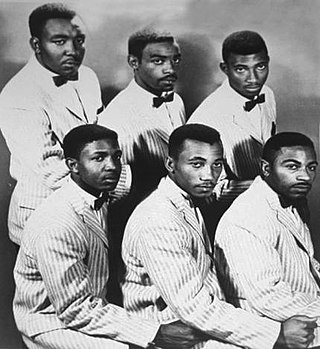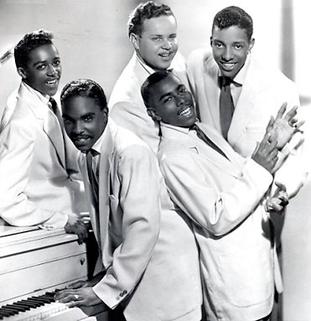
Doo-wop is a genre of rhythm and blues music that originated in African-American communities during the 1940s, mainly in the large cities of the United States, including New York, Philadelphia, Pittsburgh, Chicago, Baltimore, Newark, Detroit, Washington, D.C., and Los Angeles. It features vocal group harmony that carries an engaging melodic line to a simple beat with little or no instrumentation. Lyrics are simple, usually about love, sung by a lead vocal over background vocals, and often featuring, in the bridge, a melodramatically heartfelt recitative addressed to the beloved. Harmonic singing of nonsense syllables is a common characteristic of these songs. Gaining popularity in the 1950s, doo-wop was "artistically and commercially viable" until the early 1960s, but continued to influence performers in other genres.

Hank Ballard was an American singer and songwriter, the lead vocalist of The Midnighters and one of the first rock and roll artists to emerge in the early 1950s. He played an integral part in the development of the genre, releasing the hit singles "Work With Me, Annie" and answer songs "Annie Had a Baby" and "Annie's Aunt Fannie" with his Midnighters. He later wrote and originally recorded "The Twist" which was notably covered a year later by Chubby Checker, this second version spreading the popularity of the dance. He was inducted into the Rock and Roll Hall of Fame in 1990.

The Crows were an American R&B singing group formed in 1951 who achieved commercial success in the 1950s. The group's first single and only hit, "Gee", released in June 1953, has been credited with being the first rock n’ roll hit by a rock and roll group. It peaked at position #14 and #2, respectively, on the Billboard magazine pop and rhythm-and-blues charts in 1954. Although Gee fell into the Doo Wop genre, and "was the first 1950s doo-wop record to sell over one million records" in that genre, some consider it as the first of the "rock n' roll records".
The Orlons are an American R&B group from Philadelphia, Pennsylvania that formed in 1960. The group won gold discs for three of their singles.

The Del-Vikings were an American doo-wop musical group that recorded several hit singles in the 1950s and continued to record and tour with various lineups in later decades. The group is notable for the hit songs "Come Go with Me" and "Whispering Bells", and for having been a successful racially mixed musical group during a period of time when such groups were rare.

Maurice Williams and the Zodiacs were an American doo-wop/R&B vocal group in the late 1950s and early 1960s. Originally the (Royal) Charms, the band changed its name to the Gladiolas in 1957 and the Excellos in 1958, before finally settling on the Zodiacs in 1959.
The Flairs were an American doo-wop group known for their 1961 hit "Foot Stompin', Pt. 1." Based in Los Angeles, they went through several lineup changes during their existence. Their notable members included Richard Berry and Cornell Gunter, who would go on to be a member of the Coasters.

"In the Still of the Nite", also subsequently titled "In the Still of the Night", is a song written by Fred Parris and recorded by his band the Five Satins. Originally the song was titled "(I'll Remember) In the Still of the Nite" to distinguish itself from Cole Porter's "In the Still of the Night". Later the title was changed to "In the Still of the Night".
"I Only Have Eyes for You" is a romantic love song by composer Harry Warren and lyricist Al Dubin, written for the film Dames (1934) when Dick Powell introduced it. Several successful recordings of the song were made in 1934; later, there were charted versions by The Flamingos (1959) and Art Garfunkel (1975).
The Jesters were a doo-wop group based in New York City who achieved success in the late 1950s. They were students at Cooper Junior High School in Harlem, who graduated from singing under an elevated train station near 120th Street to the amateur night contest at the Apollo Theater, where Paul Winley discovered them and later signed them to his Winley Records.

The Midnighters were an American vocal group from Detroit, Michigan. They were an influential group in the 1950s and early 1960s, with many R&B hit records. They were also notable for launching the career of lead singer Hank Ballard and the worldwide dance craze the Twist. Between 1953 and 1962 the Midnighters had several hits on the U.S. pop and R&B charts. Their hits included the million-selling Billboard Top 10 pop hits "Finger Poppin' Time", and "Let's Go, Let's Go, Let's Go". The Midnighters also had 13 top 10 R&B hits, including three that reached number 1. Their top 10 R&B hits included "Work with Me, Annie", "It's Love Baby ", "Annie Had a Baby", "The Hoochi Coochi Coo", "Teardrops on Your Letter", "Get It", "The Float" and "Nothing but Good". They received the Rhythm and Blues Foundation's prestigious Pioneer Award in 1992 and were inducted into the Vocal Group Hall of Fame in 1999. The Midnighters are also noted for achieving a music industry milestone in 1960, by becoming the first group in history to place 3 singles in the Billboard Hot 100 at the same time. The group's lead singer, Hank Ballard, was inducted into the Rock and Roll Hall of Fame in 1990. The Midnighters as a group were inducted into the Rock and Roll Hall of Fame on April 14, 2012.

The Solitaires were an American doo-wop group, best known for their 1957 hit single "Walking Along". Although they never had a national chart hit, they were one of the most popular vocal groups in New York in the late 1950s.
The Sensations were an American doo-wop group from Philadelphia, Pennsylvania, United States.
"Bad Girl" is a 1959 doo-wop single by The Miracles. Issued locally on the Motown Records label, it was licensed to and issued nationally by Chess Records because the fledgling Motown Record Corporation did not, at that time, have national distribution. It was the first single released on the Motown label – all previous singles from the company were released on Motown's Tamla label. Although The Miracles had charted regionally and on the R&B charts with several earlier songs, including "Got a Job", "I Cry", "I Need a Change", and "(You Can) Depend on Me", "Bad Girl" was their first national chart hit, reaching #93 on the Billboard Hot 100. Written by Miracles lead singer Smokey Robinson and Motown Records' President and Founder Berry Gordy, "Bad Girl" is a sad, remorseful ballad about a young woman, whom Robinson, as the narrator, says "was so good at the start", but who later in the song "is breaking my heart". It is in the popular doo-wop style, as several of The Miracles' songs were during the late 1950s. The record's success, coupled with the distributor's failure to pay Gordy and The Miracles properly for its sales, prompted Robinson to urge Gordy to "go national" with it, meaning that Motown should do its own national distribution of its songs, and eliminate the middleman, to ensure that all money from sales of its records would go directly to the label.
The Students were an American doo-wop vocal group, which formed in Cincinnati, Ohio, United States, in 1957. Although they only released four sides, two of them – "I'm So Young" and "Every Day of the Week" – became doo-wop standards. "I'm So Young" in particular became popular and durable, and has been covered by the Beach Boys, Rosie and the Originals, The Ronettes and Kid Kyle and "The Students".

Harvey Fuqua was an American R&B singer, songwriter, record producer, and record label executive.
The Emotions are an American doo-wop vocal group from New York City, United States.
"God Only Knows" was a regional hit for Philadelphia Doo wop group The Capris. It was their debut single for the group and was written by Ruben Wright. The song also had a dramatic effect on Motown singer Marvin Gaye. It has been covered by other artists as well.
"The Stroll" is a song written by Nancy Lee and Clyde Otis and performed by The Diamonds. It reached No. 1 on the Cashbox chart, #4 on the U.S. pop chart, and #5 on the U.S. R&B chart in 1958.

Charles Williams Wright is an American singer, instrumentalist and songwriter. He has been a member of various doo wop groups in the late 1950s and early 1960s as well as a solo artist in his own right. He is also the former leader and writer of hits for the group, Watts 103rd Street Rhythm Band.










